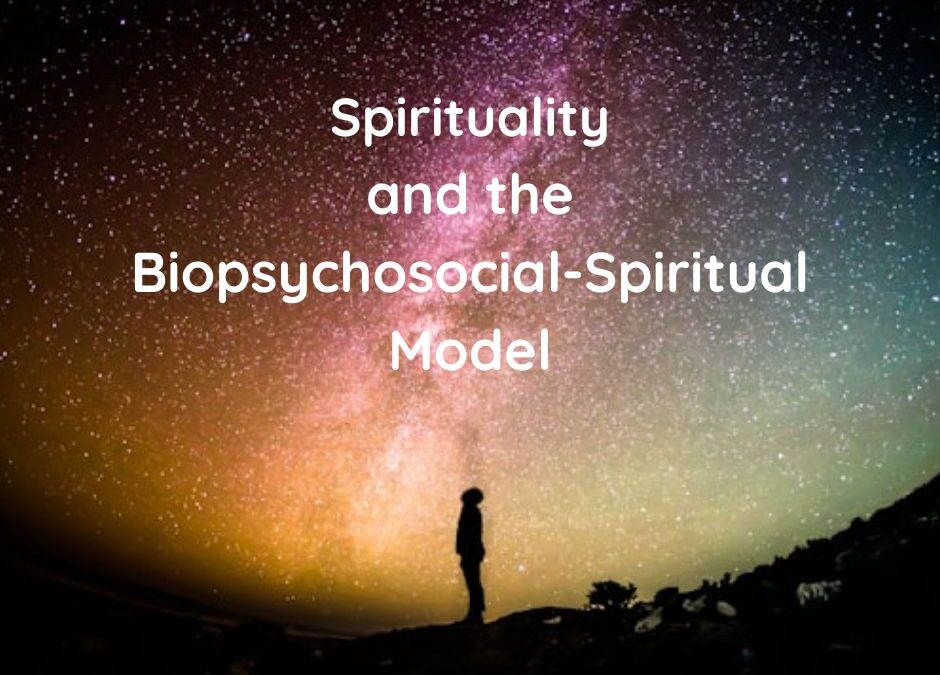Over the years, the Biopsychosocial Model has been instrumental in client-centered care for both psychiatry and therapy, leading to effective and individualized treatment and interventions for all types of mental health concerns. However, until recently, it missed an essential aspect of healing: spiritual influences.
Perhaps due to misconceptions, both clinicians and clients may steer away from discussing a person’s spirituality. I was one of these therapists! Although I believed deeply in spirituality being an essential part of who a person was, I was scared to bring it up and wasn’t sure how to incorporate it into therapy. As I’ve become more comfortable talking about spirituality with my clients, I now see it as a crucial factor in a person’s healing and recovery.
The Addition of Spiritual Dimension to the Biopsychosocial model
Moving beyond a solely biomedical perspective, the original Biopsychosocial Model is a comprehensive approach to understanding health and illness, considering the complex interplay between biological, psychological, and social factors. By acknowledging that mental health is influenced not only by genetic and physiological factors but also by an individual’s thoughts, emotions, behaviors, and social environment, the Biopsychosocial Model promotes a more holistic and personalized approach to care. The model has recently expanded to include a spiritual component, recognizing that spiritual well-being can significantly impact mental health and overall quality of life.

Understanding the Model’s Spiritual Component
The Biopsychosocial Model’s spiritual component encompasses how spiritual beliefs, practices, and experiences influence an individual’s mental health and overall well-being. Spirituality is often defined as a sense of connection to something greater than oneself, which can include religious beliefs, a connection to nature, a sense of purpose, astrology, connection to intuition or Spirit, or a search for meaning in life. By addressing the spiritual component, mental health practitioners can offer more comprehensive and personalized care, recognizing that for many individuals, spiritual well-being is a crucial aspect of their overall health.
Why is Spirituality Important to Mental Health?

Spirituality often plays a crucial role in mental health, offering individuals a framework to find meaning, purpose, and connection. Numerous studies have documented the positive impacts of spirituality, including enhanced coping skills in the face of adversity, reduced symptoms of depression and anxiety, Posttraumatic Growth, and improved overall well-being. Moreover, a strong sense of spirituality can help individuals cope with chronic illness, loss, trauma, moral injury, and other significant life challenges.
What are Some Ways Spirituality is Incorporated into Therapy?
- Exploration of a client’s spiritual beliefs and how these beliefs influence their mental health.
- Support that respects and aligns with the patient’s spiritual perspective.
- Discussion of meditation, mindfulness, yoga, and/or prayer.
- Encourage connections with spiritual communities.
- Incorporate spiritual themes into therapy sessions. This could also include journaling or reflective writing focused on spiritual experiences and growth.
- When applicable, integrate spiritual counseling or guidance from chaplains or spiritual leaders.
- Promote engagement in nature or outdoor activities that enhance spiritual well-being.
- Exploration of the potential of psychedelic-assisted therapy to facilitate profound spiritual experiences and healing.
Embracing Spirituality in Mental Health Care
Incorporating spirituality into the biopsychosocial model of care represents a profound shift towards a more holistic understanding of health and wellness. By acknowledging the spiritual dimension, mental health professionals can address the full spectrum of human experience, enhance therapeutic outcomes, and respect the diverse values and beliefs of those we serve. Spirituality in therapy offers a means for healing and a framework for exploring more profound existential questions and fostering a comprehensive sense of well-being.
As we continue to explore and validate the impact of spiritual practices and beliefs in mental health contexts, it becomes increasingly important to integrate these insights thoughtfully and respectfully into clinical practice. This inclusive approach ensures that all aspects of an individual’s identity and experiences are considered, leading to more compassionate, personalized, and effective mental health care.
About the Author

Sarah Long, PsyD, LCP, CEDS
Dr. Sarah Long is a gifted psychologist with 16+ years of experience helping people to heal from the impacts of traumatic events and recover from eating disorders. Dr. Long leads the Eating Disorder team at Catalyst, provides EMDR, Psychedelic Assisted Therapy. Dr. Long also uses her expertise in Collaborative Therapeutic Assessment to evaluate complex Eating Disorder cases and provide guidance for treatment.
Interested in Learning More?
If you are interested in learning more about incorporating spirituality in your healing journey to connecting with support, our specialized team is here to help. You are not alone. Call 720-675-7123 or contact us below.




